This is the story of a young man from a small town in Texas. He went to college, met the love of his life, married her, and landed his dream job. This is what most of us can only hope for, but Ryan Avery isn’t like most of us. Ryan Avery is a dedicated and driven young professional who also happens to be a world champion. Last year, after realizing his passion for good communication and nine months of round-the-clock practice, Avery won Toastmasters International World Championship of Public Speaking, making him, at twenty-five, the youngest person to receive the honor. With help from his wife, parents, and a “league of extraordinary mentors,” Avery took himself out of his comfort zone and onto the world stage of public speaking less than a year after his first Toastmasters club meeting in Portland, Oregon. Beating out 30,000 contestants from 116 countries delivering his speech, “Trust is a Must,” Avery took his audience on a journey straight from the heart, weaving the value of trust back and forth from his days growing up in Texas, to his first experience being ripped off after a summer of honest hard work, to standing at the altar, promising forever to his new bride.
While Toastmasters World Champions aren’t allowed to compete to reclaim their title, Avery says he does use the public speaking and leadership skills he learned from the organization every day and wholeheartedly believes good communication is the key to success. In fact, Avery’s belief is so strong that he made the difficult decision to leave his dream job as the Director of Marketing and Communications with Special Olympics Oregon in order to pursue his passion for public speaking full-time.
This month as we explore public speaking, we thought there would be no better place to start than at the top. Avery took some time to speak with the Collaborative Services blog about his experience with public speaking, how he became the world’s top speaker and why communication matters. We welcome his insights.
– – –
When did you first become interested in public speaking?
I was with Special Olympics Oregon at the time and I butchered a television interview. I said “like” every five words. “Like, these athletes are great, totally, awesome”. My dad said that I needed to join Toastmasters. When and I told him I didn’t have the money to join he said, “Perfect, I’ll pay for it,” and I said “Dang it!” But I’m really glad he did because I now understand the power of communication and why communication matters because it is the key to success. I’ve been involved with the Toastmasters ever since, for about two years now.
Public speaking is one of the things people fear the most. Did you ever experience anxiety related to public speaking or did it always come naturally to you?
My belief is that it’s not public speaking that is scary, it’s not knowing what to talk about that is scary. It’s being in front of a group and thinking, “What am I going to talk about?” For me what was hard was getting that message down, so I absolutely felt nervous and I felt worried, but once I got it down to a message I am sending from the heart and a message that I absolutely believe in, I became less nervous and more empowered. It took a long time to get that way and I did a lot of crazy things. I went to Pioneer Square in downtown Portland and gave my speech. I gave my speech in the middle of a gym sauna just so I could get used to feeling nervous. This is also what I do with my clients. We emerge them in nervousness, and they come out feeling empowered. I would hike up my pants and comb my hair weird and just try to feel the most uncomfortable that I could possibly feel at the time and still deliver my speech.
What type of process is involved in getting to the finals of Toastmasters International World Championship of Public Speaking? How long did you prepare and practice your winning speech?
There are 30,000 people from 116 countries who compete in the contest each year. There are six rounds that are defined as club, area, division, districts, semi-finals, and the world championship stage where there are nine finalists.
At the time I had only been with Toastmasters for almost a year. When I discovered that I wanted to get into the World Championship I completely immersed myself in training. I would wake up at 5:00 a.m. and work on the speech until 8:00 a.m. and then I would spend an hour with my wife every morning because family is very important to me. I would then go to work from 9:00 a.m. to 5:00 p.m. Sometimes I would take my lunch break to go and give a speech or to practice. Then I would work on it more from about 6:00 p.m. to 10:00 p.m. or later, seven days a week for nine months. I spent a minimum of six hours a day on my speech, which included writing and delivering, practicing and recording, re-writing and giving speeches, reading, and watching videos. What I wanted to do is find out what the difference was between first and second place so I dissected first, second, and third place from the past twenty-five years and found the formula I was going to use.
What criteria are the speakers competing in the World Championship judged on?
At the international level there are 14 judges and they are looking for a variety of things. There are three categories: Content, Delivery and Language. Content is worth 50 percent, Delivery is worth 30 percent, and Language is worth 20 percent. In the Content category, the judges are looking for speech development, structural organization, effectiveness (meaning how well did your message get across to the audience), and speech value (meaning was the idea and logic original). In the Delivery category they are looking at physical aspects (meaning how well did you look and use body language), voice, (meaning flexibility and volume) – Did you whisper? Did you get loud? [Also] manner, meaning directness, assurance, enthusiasm (as in, did I absolutely believe in what I was speaking about?). For the Language category they are looking for appropriateness and correctness, which is your grammar, pronunciation, and word selection. This was the hardest for me since I’m from Texas and I like to drop off my “G’s”.
Did you have a mentor for your public speaking practice or did you study any other well-known speakers? If so, what have you learned from them?
Absolutely. In my very first speech at my club contest, I videotaped it and a woman came up to me and asked if she could share the video with her friend. Her friend happened to be the 2004 World Champion of Public Speaking Randy Harvey. He saw my speech and invited me over to his house to talk about the speech. He only lived 45 minutes from where I lived so I went over to his house and he sat me down and asked why I wanted to win the world championship. I told him that I really felt I could do this and that I was in the mood to push myself to a new limit and I wanted to give a great speech. He offered to coach me as long as I promised one thing, that I would give a speech from the heart. I promised I would and he became my coach.
I also went around to different Toastmasters clubs in the Portland area and gathered a bunch of people who were good at one aspect of public speaking and built what I like to call my “league of extraordinary mentors.” I would send them videos of my speeches and ask them to critique me and send their advice. My parents were also part of the league.
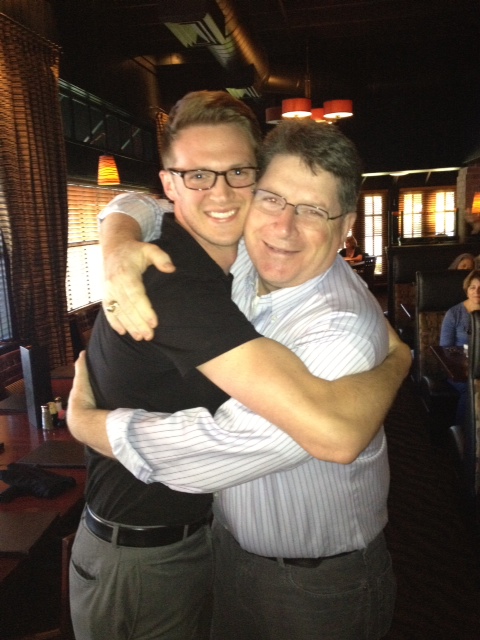
Ryan Avery with his mentor Randy Harvey after winning the Public Speaking World Championship.
(Credit: www.averytoday.com)
You are the youngest person to win Toastmasters International World Championship of Public Speaking. Was there any added pressure because of your age?
Absolutely, I believe its called the “diaper syndrome.” This is where people who are older don’t necessarily want to listen to advice from younger people because they used to wipe their butts. Instead of giving advice, I wanted to remind people that my generation has a lot to learn but we’re going places. I wanted to let them know that I was raised by good parents and am embarking on a new and very meaningful journey with my wife.
How did you decide on the topic for your winning speech, “Trust is a Must”?
This goes back to my mentor asking me to give a speech from the heart. After I won the District championship my wife and I went on a trip to the Grand Canyon. I was struggling with what to write my speech on for the next rounds and my wife said to me, “What would you cross the Grand Canyon to tell me?” I thought back to how my mother taught me how important trust is and to trust your partner. Eventually the speech became “Trust is a Must.”
While delivering your winning speech “Trust is a Must” you move around the entire stage. How does movement and body language aide in effective public speaking?
It is absolutely critical. People will only remember about 20 percent of what I say, but will remember 70 percent of how I communicate through my body. I found that while I was practicing my speech some people wouldn’t get what I was trying to say until I tilted my head a certain way, or made a certain face, or physically got on the ground and acted out picking up cigarette butts. Every gesture I did was purposeful.
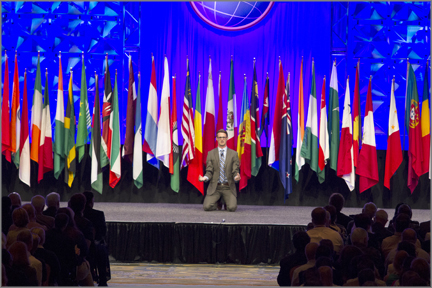
Ryan Avery delivering his award winning speech “Trust is a Must.”
(Credit: Toastmasters International)
How have you benefited from your involvement with Toastmasters?
I’ve become part of a amazing community and built wonderful relationships with friends all over the world. Toastmasters is like a fraternity or sorority of people wanting to better themselves. When I travel for work I always look up Toastmasters clubs in the areas I am going to and attend a meeting. I have had fellow Toastmasters pick me up from the airport or let me stay at their house when I am traveling. Being a part of Toastmasters also helped me get the position of Director of Marketing and Communications for Special Olympics Oregon.
How do you use your public speaking skills in your daily life?
I use it with one-on-one communication. It has helped me to know where my hands are or how to make eye contact with someone I am speaking to, or how to more effectively sell a sponsorship. Whether you are speaking one-on-one to someone or one-to-5,000 people you can use public speaking. It helps you know how to communicate to the certain group you are in. If you want to be successful you absolutely need to have good communication skills.
You’ve won the World Championship of Public Speaking, where do you go from here? What’s next for you in the realm of public speaking? Are you looking for a repeat?
Unfortunately, once you win the World Championship you can never compete again. My goal is to write a New York Times best-selling book called Communication Matters to teach the importance of good communication. I have also left my position with the Special Olympics to completely pursue my speaking. Next, my wife and I plan to do a lot of traveling and give speeches on how to be a better communicator and speaker.
What advice do you have to those who are looking to improve their public speaking?
First, join a Toastmasters club, it is a great way to learn and build confidence. I have known some people in Toastmasters who have had to practice for nine months before they can say their names out loud. Next, I suggest picking a song lyric you know well, and really like, whether it’s AC/DC or Lady Gaga, then repeat it over and over in your head before you are about to speak. This will help get the negativity out of your head and replace it with something positive during the few moments when you are the most nervous. Lastly, some of the best advice I received from one of my mentors was “No one rides a roller coaster to get to the end. Enjoy the ride.” I used to solely focus on the destination and not the journey, and this mentor explained that enjoying the journey was one of the most important things you can do.
– – –
Thank you Ryan for taking the time to do what you do best and speak with us. We enjoyed learning about your journey so far and wish you the best of luck as it continues.
To learn more about Ryan Avery visit www.averytoday.com
Liz Faris, Associate
Collaborative Services, Inc.

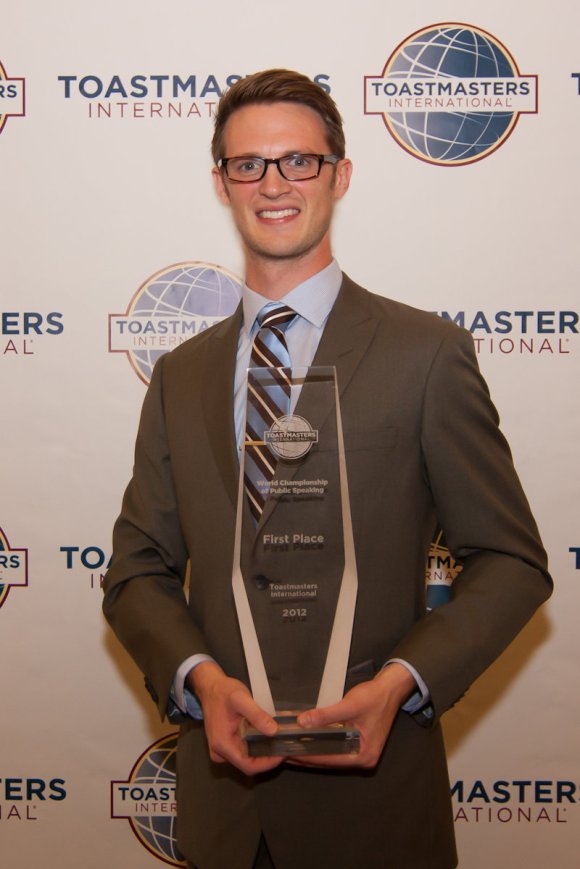



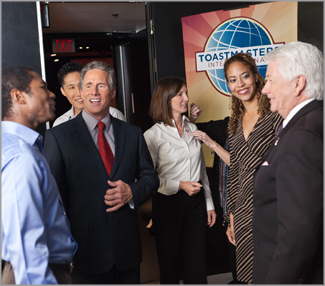

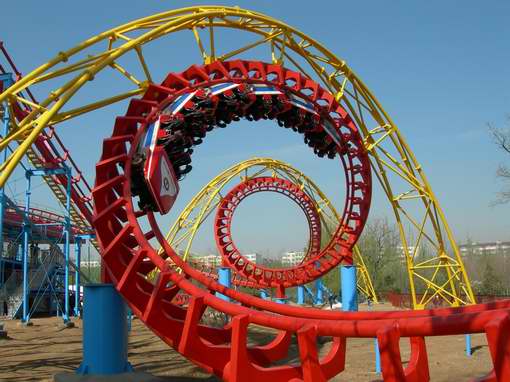
Recent Comments